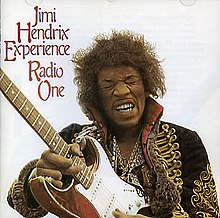Radio One (album)
| Radio One | ||||
|---|---|---|---|---|
 |
||||
| Live album by The Jimi Hendrix Experience | ||||
| Released | November 1988 | |||
| Recorded | February–December 1967 | |||
| Studio | BBC Broadcasting House and Playhouse Theatre in London | |||
| Genre | Rock, blues, soul, hard rock | |||
| Length | 50:12 | |||
| Label | Rykodisc | |||
| The Jimi Hendrix Experience chronology | ||||
|
||||
| Professional ratings | |
|---|---|
| Review scores | |
| Source | Rating |
| AllMusic | |
| Encyclopedia of Popular Music | |
| Kerrang! | 4.75/5 |
| Rolling Stone | |
| The Rolling Stone Album Guide | |
| The Village Voice | A– |
Radio One is a live album by English-American rock band The Jimi Hendrix Experience. It was released posthumously in November 1988 by Rykodisc and compiles tracks recorded between February and December 1967 for broadcasts by BBC Radio. The album peaked at number 30 on the UK Albums Chart, while in the United States, it charted at number 119 on the Billboard 200. After Hendrix's family gained control of his legacy, Radio One was supplanted by the more comprehensive BBC Sessions in 1998.
In a contemporary review for The Village Voice, Robert Christgau said Radio One is as good an introduction to Hendrix's music as his 1967 debut record Are You Experienced because while non-fanatics do not have to listen to different versions of the same songs, "Hendrix's versions do bear scrutiny like no other rock and roll." He was also impressed by the previously unreleased covers of "Hound Dog" and Curtis Knight's "Drivin' South", calling them first-rate. John Milward from the Chicago Tribune called it "one of the season's best new rock records", writing that it "supplements the first public stage of Hendrix's tragically brief evolution; the hard rock that forged his background in the blues and rhythm and blues into a sturdy platform for his instrumental pyrotechnics".Rolling Stone magazine's David Fricke was even more enthusiastic, deeming it an all-important Hendrix album that documents his artistry as it developed in its earliest stages, with recordings showcasing his blues roots, lyrical ballads, and frenzied guitar playing. He believed it covers a period of "accelerated evolution" for Hendrix in 1967, from his debut album earlier that year to his performance at the Monterey Pop Festival and his second record Axis: Bold as Love later that year:
...
Wikipedia
